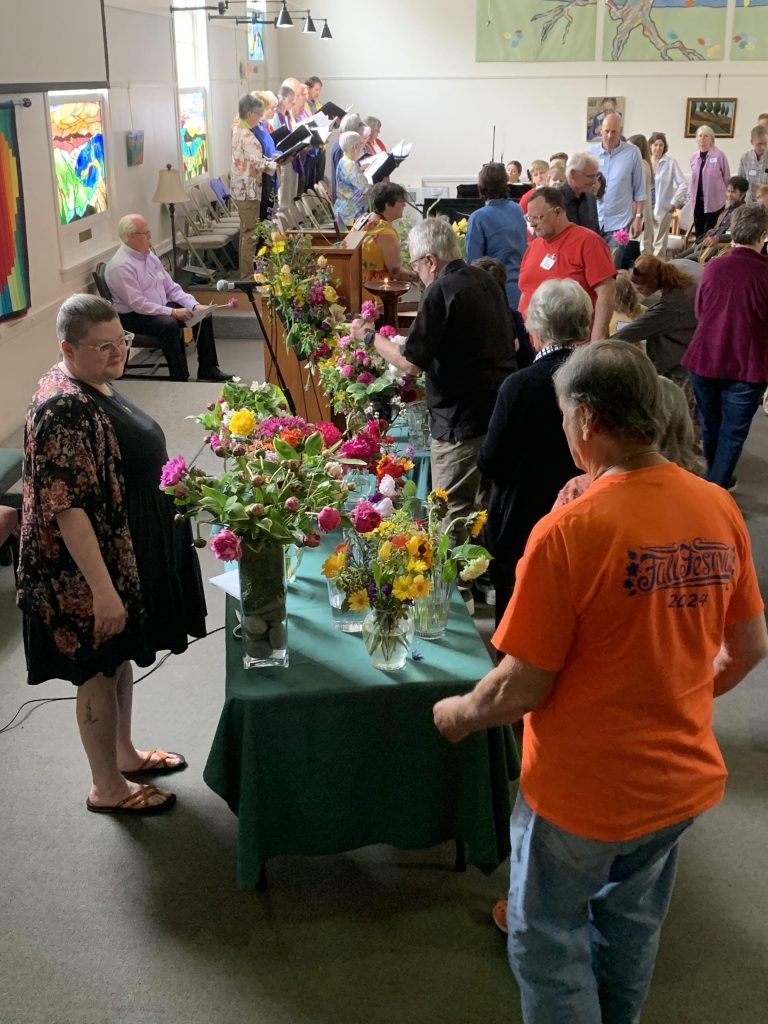Holidays & Traditions
Unitarian Universalism honors and explores wisdom from many of the world’s faith traditions. Among religious holidays, those typically observed at UU congregations include the Christian holidays of Christmas and Easter; the Jewish holidays of Passover and Yom Kippur; the winter and summer solstice celebrations; and others.
Many UU congregations also honor secular holidays, including Kwanzaa, Earth Day, Martin Luther King, Jr. Sunday, Mother’s Day, Father’s Day, Memorial Day, Labor Day, and Thanksgiving. While these are not traditionally spiritual holidays, Unitarian Universalism finds spiritual meaning and affinity with the ideas behind these and other secular holidays.
Four annual traditions are unique to our UU faith: the Fire Communion; the Flower Communion; the Water Communion; and the Bread Communion. Each ritual makes manifest the truth that no two people are alike and that a strong, loving, purpose-driven faith community requires contributions from everyone.

Fire Communion
The Fire Communion is typically held on or near the first Sunday in January, where participants write down things they wish to release from the past year and then burn those papers in a communal fire. This ceremony symbolizes letting go of regrets and preparing for new beginnings in the upcoming year. This ceremony embodies the Unitarian Universalist principles of growth, healing, and transformation, making it a significant event in the church calendar.Flower Communion
Flower Communion
The Flower Communion takes place in the spring. Before the service, each congregant places a flower they have brought with them into a shared vase or vases near the pulpit. During the ceremony, the flowers are blessed by the minister and then each congregant rises to select a flower different than the one they brought. The Flower Communion was originated in 1923 by Unitarian minister Norbert Capek, who founded the Unitarian Church in Czechoslovakia. The ceremony was later brought to the United States by his wife, Maya Capek.
Water Communion
The Water Communion is held annually, usually at the start of a new church year (September). Congregants bring a small amount of water from a place that is special to them (or they can take some from a pitcher placed at the front of the sanctuary). During the service, each person rises to pour their share of water into a large community bowl. The bowl of water is then blessed by the minister and congregation. Later, the water will be boiled and stored as “Legacy Water” for use during ceremonies that take place the rest of the year (e.g., at child dedication ceremonies). The Water Communion as practiced now was adapted from one created in 1980 by Carolyn McDade and Lucile Schuck Longview, two Unitarian Universalists who wanted to honor the ways women both contribute and draw from each other to bring change.
Bread Communion
The Bread Communion is a ritual where congregants share different types of bread, symbolizing community and gratitude for the gifts of harvest time. Congregants may bake bread or bring store-bought options, with gluten-free alternatives available. The bread is often cut into pieces and shared among attendees during and after the service. Inviting participants to bring their own bread symbolizes each person’s unique contributions to, and experiences with, UUCR’s beloved community. The Bread Communion typically takes place in November, around Thanksgiving. The act of sharing bread is a way to acknowledge the interconnectedness of all people and the sustenance provided by the Earth.
